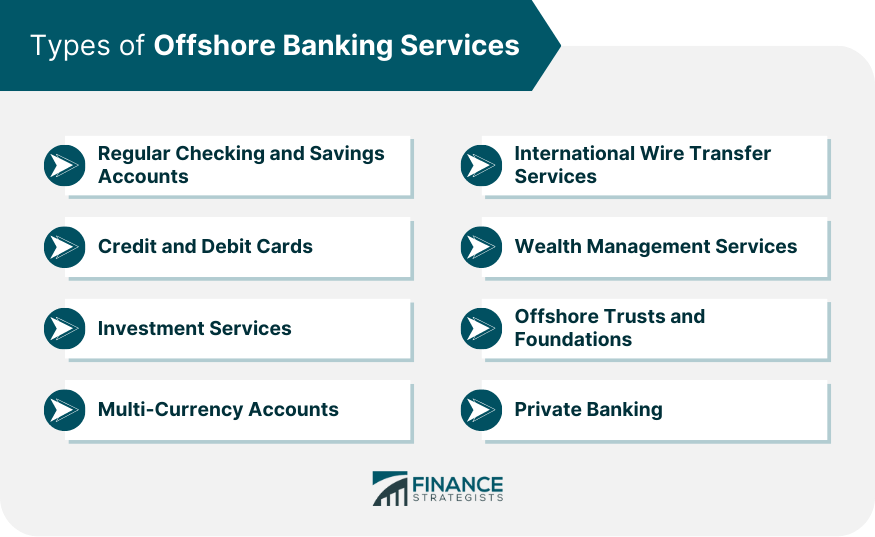Debunking Offshore Company Formations: Just How They Run and What to Anticipate
Offshore company formations can appear complicated and enigmatic. Offshore Company Formations. These entities, typically established for tax advantages and privacy, run under one-of-a-kind legal structures. Business owners may find themselves steering through a labyrinth of laws and conformity requirements. Comprehending the details is vital for success. What are the actual advantages? What are the potential risks? A closer exam reveals the nuances that can influence decision-making considerably
Comprehending Offshore Business: Interpretations and Types
Offshore business are entities developed in a territory beyond a person's or business's primary country of home, commonly for objectives related to tax optimization, asset security, or regulative benefits. These firms can take numerous kinds, consisting of limited liability business (LLCs), international company companies (IBCs), and offshore trusts. Each type offers particular functions and charms to different requirements.
Restricted obligation business offer owners with security from personal liability, while international business companies are popular for their flexibility and minimal coverage demands. Offshore trust funds, on the various other hand, are used mostly for estate planning and asset protection.
The selection of territory substantially affects the business's operations, as some areas use a lot more positive legal structures and personal privacy securities. Offshore Company Formations. Understanding the differences in between these types is vital for businesses and people taking into consideration offshore structures, as each alternative brings different implications for administration and conformity
The Benefits of Establishing an Offshore Firm
Developing an overseas business can offer numerous advantages, specifically for those looking for to enhance their financial techniques and safeguard their assets. One substantial benefit is tax optimization; many territories supply positive tax prices or exemptions, enabling companies to retain even more profits. In addition, offshore companies can provide a layer of personal privacy, shielding the identifications of owners and investors from public examination.
Another advantage is property protection. By placing possessions in an overseas entity, individuals can secure their wide range from prospective lawful cases or political instability in their home countries. This framework additionally helps with worldwide organization operations, allowing easier access to diverse clients and international markets.
The establishment of an offshore business can improve reputation and status, appealing to clients who value worldwide service techniques. On the whole, these advantages make overseas company formations an attractive option for organizations and people intending for economic development and safety.
Secret Factors To Consider Before Forming an Offshore Entity
Before creating an overseas entity, several critical factors must be assessed. Lawful conformity demands, tax obligation ramifications and benefits, in addition to territory choice, play a considerable role in the decision-making process. Recognizing these factors to consider can aid companies and individuals navigate the complexities of overseas firm formations effectively.

Legal Conformity Needs
When thinking about the development of an offshore entity, comprehending lawful compliance demands is important to ensure adherence to both local and worldwide laws. Possible local business owner must familiarize themselves with policies regulating business enrollment, reporting commitments, and functional criteria in the chosen jurisdiction. This includes verifying the legal demands for directors and investors, along with making certain compliance with anti-money laundering (AML) and know-your-customer (KYC) regulations. Additionally, companies must continue to be knowledgeable about any kind of licensing needs specific to their market. Involving neighborhood lawful and monetary professionals can supply useful understandings, making certain that all needed paperwork is prepared and sent properly. Eventually, thorough expertise of lawful conformity helps mitigate risks and cultivates a lasting offshore operation.
Tax Obligation Effects and Benefits
Numerous local business owner consider the tax obligation ramifications and benefits of forming an overseas entity as an essential element in their decision-making process. Offshore business can provide considerable tax advantages, such as minimized business tax obligation rates, exemption from certain local taxes, and the capability to delay tax obligations on foreign income. These benefits can lead to boosted productivity and capital, making overseas frameworks appealing for international company procedures. In addition, the capacity for tax treaties might even more decrease tax liabilities. It is vital for business proprietors to recognize the complexities included, including compliance with both neighborhood and international tax guidelines. Involving with tax specialists is recommended to browse these details successfully and assure excellent tax preparation techniques.
Territory Selection Aspects
What variables should one think about when picking a territory for overseas business development? Secret factors to consider include tax obligation performance, regulative environment, and political security. Territories with desirable tax regimens can substantially impact success. The regulative landscape needs to offer versatility and simplicity of conformity, permitting effective service procedures. Political security is crucial, as it ensures the security of possessions and continuity of operations. Furthermore, the track record of the territory can impact customer depend on and service partnerships. Accessibility to banking solutions and the availability of professional support services are likewise crucial. Ultimately, recognizing local laws regarding reporting, ownership, and privacy requirements is vital to establish that the offshore entity lines up with the company proprietor's objectives and legal responsibilities.
The Process of Establishing an Offshore Business
Establishing an overseas company entails a series of strategic actions that require mindful preparation and compliance with international guidelines. Initially, a specific have to choose an ideal jurisdiction that aligns with their service objectives and provides desirable Discover More Here tax obligation advantages. Following jurisdiction choice, the following action is to pick a special firm name and prepare the essential documentation, including posts of unification and investor agreements.
Once the paperwork is prepared, it has to be sent to the relevant authorities along with the required charges. After authorization, the business will certainly obtain a certification of unification, officially establishing its legal existence. The individual must then open a corporate bank account to help with monetary deals.
Preserving an offshore company involves adhering to continuous conformity needs, such as yearly coverage and tax obligations, which vary by territory. Therefore, understanding each action is important for a successful overseas business formation.
Lawful and Regulative Structure for Offshore Business
While establishing an overseas business can provide considerable benefits, it is necessary to navigate with the complex lawful and regulative framework that governs such entities. Each jurisdiction has its very own set of laws that dictate whatever from business formation to tax and compliance needs. These guidelines are designed to protect against unlawful tasks, such as money laundering and tax obligation evasion, and frequently call for extensive documentation and transparency.
Crucial element of this structure consist of the necessity of assigning local supervisors, keeping an authorized workplace, and adhering to annual coverage responsibilities. Furthermore, lots of jurisdictions impose details licensing requirements for sure business tasks. Understanding these lawful specifications is vital for making certain compliance and mitigating dangers connected with fines or lawful conflicts. Subsequently, engaging with lawyers that specialize in offshore firms can aid in navigating with this complex landscape, ultimately assisting in a successful and compliant offshore service operation.
Common Misunderstandings Concerning Offshore Firms
Many people hold mistaken beliefs about overseas firms, often relating them with tax obligation evasion and prohibited tasks. It is important to identify that these entities can run lawfully within a framework made for reputable service practices. Making clear the lawful condition of offshore firms can assist dispel these misconceptions and promote a much more precise understanding of their purpose.
Tax Obligation Evasion Myths
Despite the growing appeal of overseas firms, misconceptions about their usage for tax evasion linger. Many people wrongly believe that developing an offshore entity is only a way to stay clear of taxes. However, overseas companies are usually used for reputable functions, such as property security, international organization growth, and financial investment diversification. The perception that all offshore tasks equate to illegal tax obligation evasion overlooks the complexities of international tax obligation policies and conformity needs. Additionally, the substantial majority of offshore territories have carried out Recommended Site actions to fight tax obligation evasion, advertising transparency and info exchange. This mischaracterization can hinder genuine organizations and investors from discovering the prospective benefits of overseas business formations while bolstering a negative stigma surrounding these entities.
Legal Condition Clarified
The lawful standing of overseas firms is often misunderstood, resulting in a range of mistaken beliefs. Several think these entities run in a lawful grey location, assuming they are inherently illegal or unethical. Actually, overseas firms are reputable organizations created under the regulations of specific territories, designed for various reasons, including asset protection and market expansion. Another usual misunderstanding is that offshore companies escape taxes completely; however, they are subject to the regulations and tax obligation commitments of their home countries. Additionally, some individuals assume that offshore companies can be conveniently manipulated for money laundering or illegal tasks. While misuse can occur, most territories implement strict why not find out more conformity and openness laws to minimize such dangers, making sure that offshore firms operate within lawful structures.

Handling and Running Your Offshore Firm Effectively
Successfully managing and operating an offshore business calls for a critical approach that balances conformity with neighborhood regulations and the pursuit of service objectives. Effective overseas management involves comprehending the territory's tax obligation legislations, reporting needs, and operational policies. Using regional experts, such as accounting professionals and lawful experts, can provide indispensable insights into passing through these intricacies.
In addition, establishing clear interaction networks and functional methods is essential for keeping effectiveness. Using technology for project management and cooperation can enhance efficiency, while routine performance assesses warranty positioning with calculated goals.
Keeping robust financial documents is vital, as transparency promotes count on with stakeholders and complies with global requirements. Being adaptable to changes in regulations or market problems enables overseas companies to pivot properly, ensuring lasting sustainability and growth. By sticking to these principles, organization proprietors can maximize the benefits of their overseas ventures while mitigating dangers.
Frequently Asked Concerns
Just how Much Does It Cost to Preserve an Offshore Firm Yearly?
The expense to keep an offshore business each year varies significantly, typically ranging from $1,000 to $5,000, depending upon territory, services required, and compliance commitments. It is necessary to think about extra charges for certain demands.
Can I Open Up a Financial Institution Account for My Offshore Business From Another Location?
Opening up a checking account for an overseas company remotely is typically feasible. However, requirements might vary by jurisdiction, often demanding documents and confirmation procedures, which can complicate the remote application experience for individuals.
Are There Particular Countries Recognized for Easier Offshore Company Formations?
Specific countries, such as Belize, Seychelles, and the British Virgin Islands, are renowned for their favorable policies and structured procedures pertaining to offshore business developments, attracting business owners seeking efficiency and confidentiality in service procedures.
What Types of Services Are Finest Fit for Offshore Firms?
Certain organizations, such as consultancy, e-commerce, and investment companies, usually take advantage of offshore business because of tax obligation advantages, personal privacy, and regulatory adaptability - Offshore Company Formations. These entities typically flourish in jurisdictions that advertise desirable company settings
Exactly How Can I Make Certain Compliance With Neighborhood Laws When Operating Offshore?
To assure conformity with local legislations when running offshore, it is vital to involve legal professionals, perform extensive study on territory policies, and keep transparent monetary documents, therefore reducing dangers related to non-compliance.
